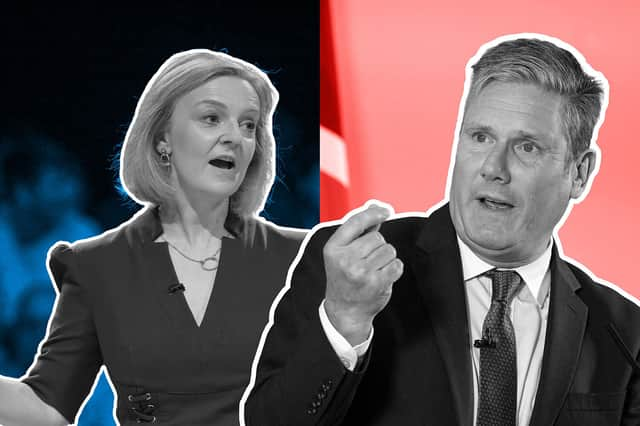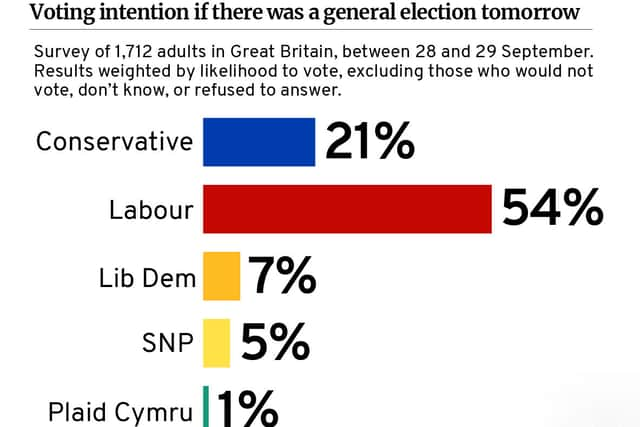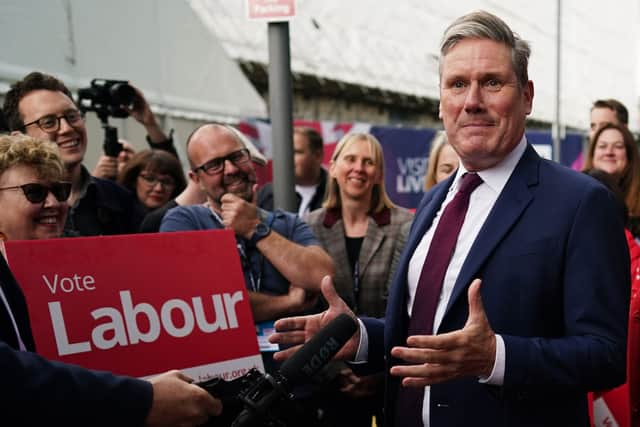UK opinion polls latest: how do Labour and Conservatives compare - what would general election results be now?


The Labour Party has stormed to a record lead in opinion polls, as support swings towards the opposition amidst the UK’s current economic crisis.
Opinion polls are of course just an estimate of voter intention, and are based on representative samples of the population, rather than the whole electorate.
Advertisement
Hide AdAdvertisement
Hide AdIt should also be noted that the next general election may not take place until January 2025 at the latest, and a lot can change before then.
What are the latest opinion poll results?
A YouGov poll of 1,712 adults has placed Labour 33 points ahead of the Conservatives - at 54% compared with just 21% - when voters were asked which party they would choose if a general election took place tomorrow.
This is believed to be the largest lead for Labour in any recorded poll since 1998, when Tony Blair was Prime Minister.
According to the poll, the Lib Dems are sitting at 7%, the Green Party is at 6%, and SNP is at 5%.


What would this look like in a general election?
Advertisement
Hide AdAdvertisement
Hide AdIf these results were replicated in an election, Labour would win 498 seats - an increase of 296 - and the Conservative Party would drop to just 61.
In the 2019 election, the Tories won an 80-seat majority of 365, compared to Labour’s 202 seats.
How does the opinion poll work?
YouGov’s opinion poll, which was conducted between 28 and 29 September, is currently weighted by likelihood to vote. This means when you remove those who do not know who they would vote for, or who would refuse to vote, the Conservatives have 15% of the vote and Labour has 32%.
Meanwhile, the research company’s analysis also revealed that only 37% of people who voted Tory in the last election, where the party secured its landslide victory, would now vote for them.
Loading....
What’s behind the latest opinion poll results?
Advertisement
Hide AdAdvertisement
Hide AdThe huge shift in support comes after last week’s announcement of the government’s mini-budget, which saw Chancellor Kwasi Kwarteng announce a series of tax cuts.
This was followed by economic turmoil, with the British pound hitting a record low. The Bank of England also launched an emergency intervention, saying it would buy the Government’s bonds on “whatever scale is necessary.”
Much of the market mayhem has been blamed on the lack of an economic forecast by the Office for Budget Responsibility (OBR), which was not requested by the Treasury. This was in spite of the fact that the OBR’s analysis of a budget’s impact on the country’s economy is usually a requirement.
The Prime Minister reportedly did not want to wait for the full Budget to implement the Government’s new economic strategy, as she wanted to take action on the cost of living crisis as soon as possible.
How has voting intention changed over time?
Loading....
Advertisement
Hide AdAdvertisement
Hide AdThe interactive chart above shows how the parties’ fortunes have changed since January 2020, when new prime minister Boris Johnson enjoyed a comfortable lead over Labour.
Sir Keir Starmer’s opposition started to overtake the Tories in December 2021, as the government became mired in a series of scandals like the lobbying row and Partygate, wheventually led to the resignation of Johnson in July.
But it’s been a nightmare start for Liz Truss, with the market reaction to the mini-budget leading to a record lead for a resurgent Labour.
Of course, opinion polls are just snapshots of the prevailing public mood - not projections or forecasts - but they are important for establishing how a political party’s recent decisions or actions have been received by the country’s citizens.
Advertisement
Hide AdAdvertisement
Hide AdSir Keir Starmer said earlier this week that his “hope” of gaining the keys to Number 10 had turned into “belief” following Labour’s annual conference in Liverpool.
The Holborn and St Pancras MP commented: “We’ve done a huge amount of work to change the Labour Party over the last two years, and the polls are reflecting that. The confidence is reflecting that.”
He continued: “I know we’ve got to earn every vote but nobody is now saying to me it’s impossible for Labour to win the next election.”
Elsewhere, a poll published yesterday (29 September) by Survation gave the opposition a vote share of 49%, and the Conservatives 28%.


When is the next general election?
Advertisement
Hide AdAdvertisement
Hide AdUnless a snap election is called by the current government, which at present seems highly unlikely, the next general election is at least two years away - with the latest possible date set at 23 January, 2025. This means there is plenty of time for the numbers - and opinions - to change.
But, for this shift to come both just after Labour’s annual conference, where Starmer and his shadow ministers outlined a series of the party’s policy pledges - in addition to a mere three weeks after Truss became Prime Minister - makes for a pretty significant moment in the political landscape.
Comment Guidelines
National World encourages reader discussion on our stories. User feedback, insights and back-and-forth exchanges add a rich layer of context to reporting. Please review our Community Guidelines before commenting.
